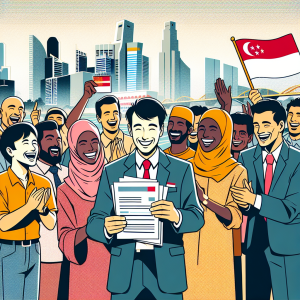Overview of Singapore’s Public Housing System
Singapore’s public housing system, managed by the Housing Development Board (HDB), is often hailed as a global benchmark for providing affordable housing to its citizens. Approximately 80% of Singaporeans live in HDB flats, which cater primarily to low- and middle-income families. This model has successfully ensured that the majority of the population has access to quality housing, contributing significantly to the nation’s social stability and economic growth.
Current Challenges: An Overheated Market
However, recent developments indicate that Singapore’s public housing system is facing unprecedented challenges due to an overheated real estate market. Property prices have surged dramatically, raising concerns about affordability for many families. According to the latest reports, the prices of HDB resale flats have seen an increase of nearly 15% over the past year alone, putting pressure on the very foundation of Singapore’s housing policy.
The government’s proactive measures to manage this situation have included implementing cooling measures aimed at curbing speculative buying. These measures involve increasing stamp duties and tightening loan-to-value limits, which are designed to stabilize the market and prevent a housing bubble. Yet, despite these interventions, the demand for housing continues to outpace supply, creating a precarious situation for many prospective homebuyers.
Economic Context: Resilience Amidst Challenges
Singapore’s economy is characterized by its dynamic and export-driven nature, heavily reliant on sectors such as finance, manufacturing, and technology. The resilience of the economy, particularly in the aftermath of the COVID-19 pandemic, has been commendable. Strong fiscal policies and strategic economic planning have helped Singapore navigate global economic uncertainties.
However, the rapid rise in property prices poses a dual challenge: it not only affects housing affordability but also threatens to impact the overall economic stability. The Straits Times Index (STI), which serves as a barometer for the nation’s economic health, has experienced volatility, reflecting concerns over domestic economic conditions and external influences.
The Path Forward: Balancing Growth and Equity
As Singapore grapples with these challenges, its approach to public housing and economic policy remains a crucial area of focus. The government’s commitment to sustainable development and long-term affordability is essential for maintaining social equity. Experts suggest that further measures may be necessary to ensure that housing remains accessible to all segments of the population, particularly as the market continues to evolve.
In conclusion, while Singapore’s public housing system has historically been a model of success, the current strain from an overheated market underscores the need for ongoing vigilance and adaptation. The government’s interventions in the housing sector will be vital in preserving the balance between economic growth and social equity, ensuring that Singapore remains a leading global city where all citizens can thrive.





